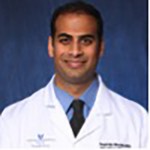
The following weekly column is written and sponsored by Virginia Hospital Center, a proud member of the Mayo Clinic Care Network and one of America’s 100 Top Hospitals for the third year in a row.
 A conversation with Rohit Modak, MD, Infectious Diseases specialist, Virginia Hospital Center Physician Group
A conversation with Rohit Modak, MD, Infectious Diseases specialist, Virginia Hospital Center Physician Group
What is the flu?
Influenza is a serious disease that affects more than three million people in the United States each year. The flu is very contagious and spreads mainly by social contact. Most people recover within a week to 10 days, but complications can occur, including pneumonia, bronchitis, sinus infections and ear infections.
The flu can be deadly for certain high-risk patients, including people over 65, pregnant women, young children and anyone with chronic health problems, such as asthma, diabetes or heart disease.
What are the symptoms?
Flu symptoms typically develop suddenly and may include:
- Fever and chills
- Cough
- Sore throat
- Runny nose
- Body aches
- Headache
- Fatigue
- Vomiting and diarrhea, especially in children
How is the flu treated?
There are prescription antiviral medications that work best if started at the beginning of your symptoms. Please discuss this with your doctor.
If you have the flu, stay home, get plenty of rest, and drink clear fluids such as water, broth or sports drinks to prevent dehydration. Over-the-counter medications may relieve some of your symptoms but will not make you less contagious.
What can I do to protect myself, and my family, from the flu?
The single best way to protect against the flu is to get a flu vaccine each year. The Centers for Disease Control and Prevention (CDC) recommend it for everyone six months and older. The vaccine is available by shot or by nasal spray.
In addition, you and your family can take everyday precautions to stay healthy. Avoid sick people and wash your hands frequently to reduce the spread of germs. If you have the flu, stay home from work or school.
When is flu season?
Flu season peaks in the United States between December and February. However, the season can begin as early as October and last until May. During this time, flu viruses circulate at higher levels in the population.
When should I have my flu shot?
Ideally, you should have a flu shot soon after the vaccine becomes available in your area. Early immunization is most effective, but as long as flu viruses are circulating in the community, it’s not too late to get vaccinated.
I’m young and healthy, why do I need a flu vaccine?
The flu affects people in different ways and every flu season is different. While it’s true that the virus is most dangerous for people over the age of 65, even young, healthy people can get very sick from the flu and spread it to others.
Having a flu shot is not just good for you, it’s good for the community, too. When more people get vaccinated, less flu can spread.
Where can I get the flu vaccine?
- It’s easy to find a great primary care physician who administers the flu vaccine – and offers same-day appointments, in-house lab services and accept new patients. The Virginia Hospital Center Physician Group has primary care practices conveniently located in Alexandria, Arlington, Falls Church, McLean and Tysons Corner. Visit vhcphysiciangroup.com/primary-care.
- Stop by the Outpatient Pharmacy at Virginia Hospital Center. Our immunizations-certified healthcare professionals can administer flu vaccine for adolescents, adults, and seniors Monday to Friday between 8:30 a.m. and 5:00 p.m. No appointment is necessary. Flu shots are covered by most insurance plans including Medicare Part B. If you don’t have insurance, our flu vaccine is competitively priced.
- Businesses can schedule flu shot clinics at their work site through Virginia Hospital Center’s HealthWorks program. For more information call the Health Promotion Department at 703-558-6740.
The views and opinions expressed in the column are those of the author and do not necessarily reflect the views of ARLnow.com.

